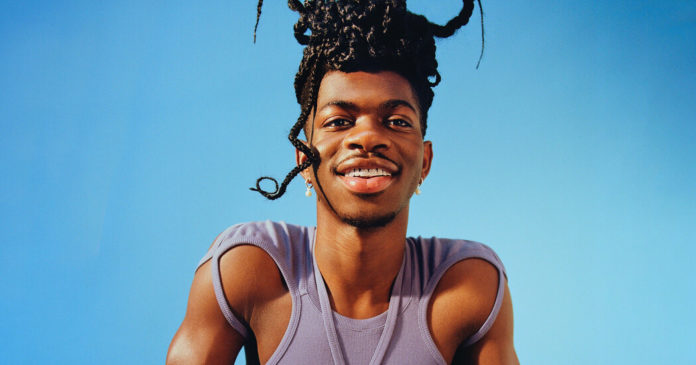
After an extended custody battle, the brothers begrudgingly moved in with their father. The move took them, as Lamarco put it, from “hood county to nerds county” — which is to say Austell, a well-to-do suburb just north of Atlanta, and then Lithia Springs. This was a crushing blow. Their mother had become addicted to drugs — Nas wondered aloud to me if the big move catalyzed her problem — and their grandmother was the plinth of their lives. Nas became sullen and insolent. His father, who had by this point married and had more children, was a gospel singer, and church became a bigger part of Nas’s life at the same time as his romantic thoughts about other boys did — along with a growing interest in gay porn. He thought his same-sex attraction was a test, something God put in front of him to prove his devotion. But he would watch the porn anyway, feeling the darkest shame afterward, “like I just laid in mud and ate poop.” He dreamed of running away, even ending his life.
He had two sources of comfort. The first was a Nintendo DSI, a game console that he won in a school contest; it had a camera and a voice recorder that he used to create content. The second was Nicki Minaj. It’s the age-old connection between gay men and divas: Some men fall for Cher and others for Whitney Houston, but if you were a Black, closeted teenager in the South with a defiant spirit, a pugnacious personality and a deep appreciation for colorful wigs, then Nicki Minaj was your woman. As a teenager, Nas was a steadfast member of the Barbz, a collective of cutthroat, obsessively loyal Nicki Minaj fans. He felt personally responsible for her professional protection, like a soldier in the army of the woman who helped him figure out who he was. He would spend every waking hour online, tweeting as @nasmaraj — Maraj is the diva’s real last name — dedicating himself to making content that either uplifted her work and denigrated others’ or promoting himself as an internet personality. (And then, when he first hit it big and fans figured out his internet past, he denied every part of this, not wanting people to know he was gay.)
Eventually, he gathered hundreds of thousands of followers and learned how to game social media by “tweetdecking” — coordinating with other users to make tweets (often content stolen from smaller accounts) go viral. He would post things like a photo of a sad-looking dog, grabbed from Google Images, with a caption that said this was because no other dogs showed up at his birthday party. (There was a whole BuzzFeed article about that one, in which he was quoted as “Nasiir Williams.”) But in 2018, Twitter suspended his account, removing years of his work. Around the same time, he broke up with a secret boyfriend and failed a class during his first year at the University of West Georgia. Then his grandmother died — and he thought, with everything else going wrong, that maybe he would die, too. He worried himself into hypochondria, convinced that his life wouldn’t go on much longer.
One day, procrastinating over math homework, he wrote a song called “Shame” and promoted it on his new Twitter account. People liked it, so he made a few more songs, most of which received positive feedback from his internet friends. (It was around this time that he decided on his moniker: “Nas” from his alias, “Lil” because that’s just what rappers did and, later, X, the Roman numeral 10, to denote the number of years that he expected to elapse before he became a legend.) The contentment he got from making music was like nothing else, so perfect it almost felt holy. “I have this feeling like: You know what? This is mine. This is for me, and I commit myself to it,” he said. He was always so impatient, never able to settle on one thing. This was different. His father and stepmother, though, gave him an ultimatum: music or school. He decided to drop out of college.
He started attaching his music to his viral tweets, suspecting that was the way to make it pop off. One day, his mind scanning the internet like a Google algorithm, he noticed an emerging theme: Country trap videos — collisions of hip-hop beats and country tropes — were gaining popularity. What if he wrote a country-themed banger that was also funny and told a story? In 2018, he bought a $30 beat on YouTube, wrote some lyrics — “Cowboy hat from Gucci, Wrangler on my booty” — and posted it, like his other songs, to SoundCloud that December. He named it “Old Town Road” because it sounded like a “real country place” and deluged the internet with memes attached to the song, hoping one would go viral. He even, famously, posted “What’s the name of the song that goes ‘take my horse to the old town road’” on a part of Reddit dedicated to helping people track down earworms. The song spilled over to TikTok, a new barometer for whether a song is a hit, and caught fire. “A lot of people like to say it’s like a kid accidentally got it,” he told Joe Coscarelli, a culture reporter for The Times. “No, this is no accident. I’ve been pushing this hard.” In March, the song charted on Billboard’s Hot 100, Hot Country and Hot R.&B./Hip-Hop charts at the same time. When Billboard removed the song from its country list, citing an edict that this song about horses did “not embrace enough elements of today’s country music,” fans protested at the perceived racial slight — was the message that Black people didn’t belong in country music? — which only brought more attention.
Nas felt that he had written a bona fide country song and wanted one of the genre’s legends to join him. Months earlier, he tweeted that he hoped to get Billy Ray Cyrus on a remix. (He knew of the country singer from “Hannah Montana,” the Disney Channel show starring his daughter, Miley.) Cyrus was excited to do it. “I think it was No. 19 at the time,” he told Rolling Stone in May 2019. “I thought maybe I could help him drop the 9.” A week after their collaborative remix dropped, in April, “Old Town Road” became the No. 1 song in the world. It ended up topping the Billboard 100 for nearly five months in a row, longer than “I Will Always Love You” and “Macarena.”








